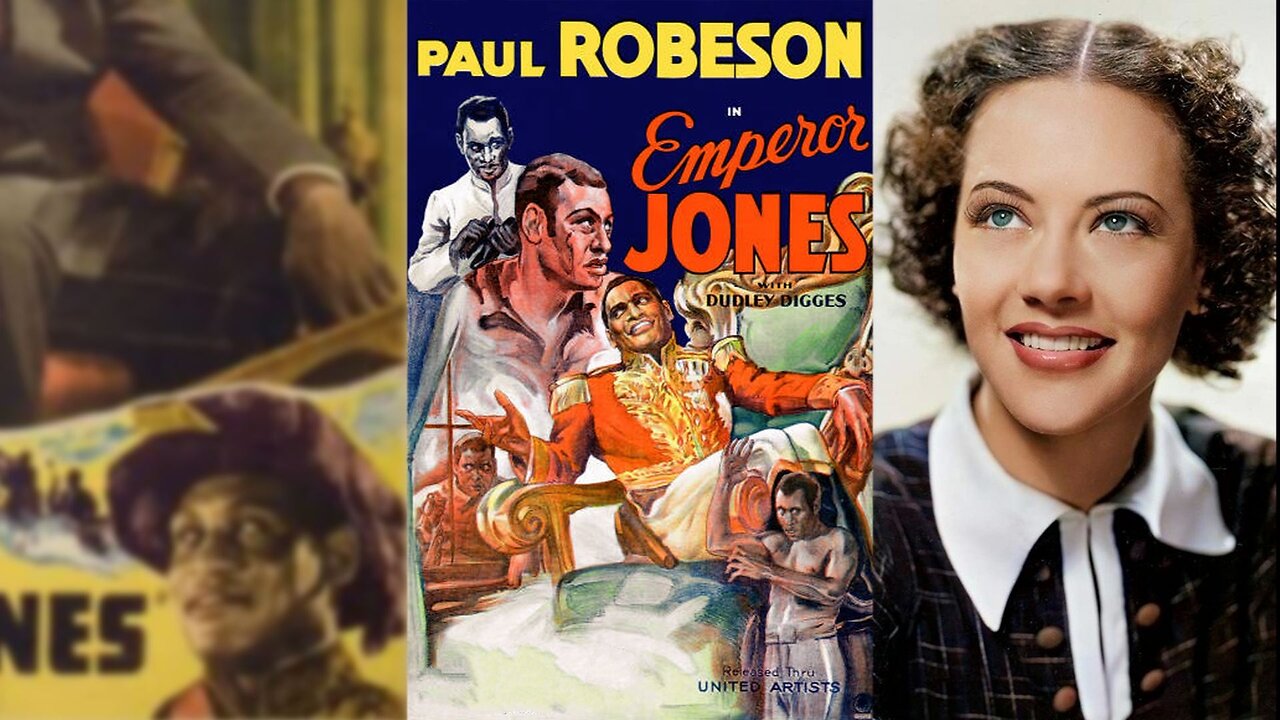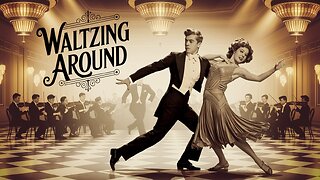Premium Only Content

THE EMPEROR JONES (1933) Paul Robeson, Dudley Digges & Fredi Washington | Drama | B&W
The Emperor Jones is a 1933 American pre-Code film adaptation of Eugene O'Neill's 1920 play of the same title, directed by iconoclast Dudley Murphy, written for the screen by playwright DuBose Heyward and starring Paul Robeson in the title role (a role he played onstage, both in the US and UK), and co-starring Dudley Digges, Frank H. Wilson, Fredi Washington and Ruby Elzy.
SYNOPSIS
Unscrupulously ambitious Brutus Jones escapes from jail after killing a guard and through bluff and bravado finds himself the emperor of a Caribbean island.
At a Baptist prayer meeting, the preacher leads a prayer for Brutus Jones, who has just been hired as a Pullman porter. Jones proudly shows off his uniform to his girlfriend Dolly before joining the congregation for a spiritual. But Jones is quickly corrupted by the lures of the big city, taking up with fast women and gamblers. One boisterous crap game leads to a fight in which he inadvertently stabs Jeff, the man who had introduced him to the fast life and from whom he had stolen the affections of the beautiful Undine.
Jones is imprisoned and sent to do hard labor on a chain gang. Jones escapes after striking a white guard who was torturing and beating another prisoner. Making his way home, he briefly receives the assistance of his girlfriend Dolly before taking a job stoking coal on a steamer headed for the Caribbean. One day, he catches sight of a remote island and jumps ship, swimming to the island.
Jones, hunted by natives in revolt, flees through the jungle and slowly disintegrates psychologically. Hysterical, he runs into the path of his pursuers.
CAST & CREW
Paul Robeson as Brutus Jones
Dudley Digges as Smithers
Frank H. Wilson as Jeff
Fredi Washington as Undine
Ruby Elzy as Dolly
George Haymid Stamper as Lem
Jackie "Moms" Mabley as Marcella
Blueboy O'Connor as Treasurer
Brandon Evans as Carrington
Rex Ingram as Court Crier
Directed by Dudley Murphy
Screenplay by DuBose Heyward
Based on The Emperor Jones 1920 play by Eugene O'Neill
Produced by Gifford Cochran, John Krimsky
Cinematography Ernest Haller
Edited by Grant Whytock
Music by Rosamond Johnson, Frank Tours
Distributed by United Artists
Release date September 29, 1933
Running time 80 minutes (Original cut) 73 minutes
Country United States
Language English
Budget $263,000
NOTES
The film is based rather loosely on O'Neil's play, but adds an entire backstory before O'Neill's actual play begins, and includes several new characters that do not appear in it (such as Jones' girlfriend, and a friendly priest who advises him to give up his evil ways). The film does provide what may be Robeson's greatest dramatic performance in a movie.
In the film version, the opening shots are of an African ritual dance. Some critics assess the opening as representative of the "primitive" black world to which Brutus Jones will eventually revert, but some scholarly reviews reflect the relationship between the roots of the African-American church and the rhythmic chanting often seen in African religious practices. The film's director Dudley Murphy had co-directed Ballet Mécanique and other musical experimental films. Having just spent several years in Hollywood, he now craved the freedom to use musical forms as a way of translating O'Neill's stage experimentation into film. Robeson was already a musical star and would go on to study traditional African music and dance while on location in Nigeria and with scholars in London.
The film makes copious use of the word "nigger", as did O'Neill's original play. African-Americans criticized O'Neill's language at the time, so its preservation and expansion in the film present another cause for critique. In fact, in the original production in 1920, the actor playing Jones, Charles Sidney Gilpin, a leading man in the all-African-American Lafayette players, voiced his objections to O'Neill and began substituting "Negro" in the Provincetown Players premiere. He continued to do so when the show went on tour for two years.
O'Neill had based the character, down to some specific traits and use of language, on an African-American friend from the New England waterfront, and felt that the use of the word was dramatically justified. Gilpin and O'Neill could not reconcile, and O'Neill gave the part to the much younger and unknown Robeson for the 1924 New York revival and then its London premiere, both of which launched Robeson as the first African-American leading man of American and British theater.
In 1999, the film was deemed "culturally, historically, or aesthetically significant" by the United States Library of Congress, and selected for preservation in the National Film Registry.[citation needed] setting the stage for its restoration.
#oldmovies #freemovies #lostandfoundfilms
-
 29:12
29:12
Lost n Found Films
1 day agoWALTZING AROUND (1929) Harry Gribbon, Andy Clyde & Marjorie Beebe | Sport | Short
401 -
 31:34
31:34
Friday Beers
13 hours ago $0.88 earnedOur Horrifying Night Drunk Ghost Hunting the Manson Murders
26.9K6 -
 7:02
7:02
China Uncensored
14 hours agoWell, I Guess Now We Know...
2.79K14 -
 46:10
46:10
Members Club
17 hours agoThe WNBA Has Demands, TSA Loosens Up, and NYC Has a Whale Whisperer - MC04
1.17K -
 1:35:15
1:35:15
Man in America
13 hours ago🚨 ALERT: Hospitals in the U.S. Are KILLING Patients… for Their Organs!
73K31 -
 8:00
8:00
DropItLikeItsScott
14 hours agoIs This The BEST SIG P365? SIG P365 FUSE
1.12K -
 11:55
11:55
The Shannon Joy Show
13 hours ago🔥Babies Aborted for Cash.🔥
2.14K -
 6:24
6:24
Zach Humphries
14 hours agoBreaking Crypto News on Crypto Regulation!
3.92K2 -
 15:41
15:41
BaldBrad
14 hours agoDeclassified BOMBSHELL: CIA Lied About Trump-Russia! Putin Never Backed Trump | Russiagate Exposed
3.67K4 -
 13:07
13:07
Nate The Lawyer
16 hours ago $0.70 earnedWNBA Loses $500M But Players Want More Money. $40M Lost Last Year.
5.49K6